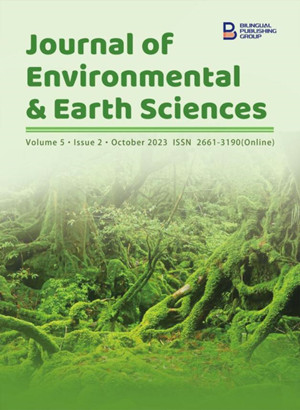
Hydrogeological Investigations of Groundwater and Surface Water Interactions in the Berg River Catchment, Western Cape, South Africa
DOI:
https://doi.org/10.30564/jees.v5i2.5918Abstract
The Berg River Catchment based in the Western Cape Province, South Africa services the greater Cape Town area with water, subsequent to supplying the vast agricultural activities that exist in the middle and the lower reaches. This study thus investigates the hydrogeochemical interactions between surface and groundwater in the Berg River Catchment with the aim of establishing trends and transfer of constituents between the surface and groundwater systems, investigates the role that geology plays in water chemistry as well as identifies the geochemical processes controlling surface and groundwater chemistry in the catchment. This study was carried out using three types of research designs namely i) experimental research design; ii) field research design and meta-analysis research design. Furthermore, the study made use of hydrochemical data ranging from 2003 to 2013 obtained from the National Water Monitoring Database owned and maintained by the Department of Water and Sanitation and data that were sampled in 2016 by authors and analyzed using the ICP-MS Technique Ground Water Chart, Arc-GIS and Geosoft (Oasis Montaj) were further employed to model the data. The results indicated that: i) in the Upper Berg there is not much interaction and transfer of constituents between surface and groundwater; ii) the Middle Berg, however, indicated a degree of interaction with the sharing of constituents between the two water systems and iii) the Lower Berg indicated only NaCl water type also noting that the area situated near the river mouth whereby there is the mixing of river and seawater.
Keywords:
Hydrogeology; Groundwater; Surface water; Interactions; Berg River CatchmentReferences
[1] Lintern, A., Webb, J.A., Ryu, D., et al., 2018. Key factors influencing differences in stream water quality across space. Wiley Interdisciplinary Reviews: Water. 5(1), e1260.
[2] Khatri, N., Tyagi, S., 2015. Influences of natural and anthropogenic factors on surface and groundwater quality in rural and urban areas. Frontiers in Life Science. 8(1), 23-39.
[3] Madlala, T.E., 2015. Determination of groundwater-surface water interaction, upper Berg River catchment, South Africa [Master's thesis]. Cape Town: University of Western Cape.
[4] Görgens, A.H.N., Clercq, W.P., 2005. Research on Berg River Management: Summary of Water Quality Information System and Soil Quality Studies [Internet]. Available from: https://www.wrc.org.za/wp-content/uploads/mdocs/TT%20252.06.pdf
[5] Rossouw, N., Malan, S., 2007. The importance of theory in shaping social impact monitoring: Lessons from the Berg River Dam, South Africa. Impact Assessment and Project Appraisal. 25(4), 291-299.
[6] Albhaisi, M., Brendonck, L., Batelaan, O., 2013. Predicted impacts of land use change on groundwater recharge of the upper Berg catchment, South Africa. Water SA. 39(2).
[7] Berg River Improvement Plan 2012 [Internet]. Western Cape Government; 2012. Available from: https://www.westerncape.gov.za/eadp/sites/eadp.westerncape.gov.za/files/atoms/files/BRIP_Final%20Report_abridged.pdf
[8] Cullis, J.D., Horn, A., Rossouw, N., et al., 2019. Urbanisation, climate change and its impact on water quality and economic risks in a water scarce and rapidly urbanising catchment: Case study of the Berg River Catchment. H2Open Journal. 2(1), 146-167.
[9] DWAF., 2007. Berg River Baseline Monitoring Programme. Final Report—Volume 5: Synthesis. Pretoria, South Africa.
[10] Midgley, D.C., Pitman, W.V., Middleton, B.J., 1994. Surface water resources of South Africa 1990. Water Research Commission: Pretoria.
[11] Council for Geoscience, 2019. Geology map of South Africa. Council for Geoscience: Pretoria.
[12] Kisters, A., 2016. What Lies Beneath Table Mountain or All Models are Wrong, But Some are Useful [Internet]. Available from: https://www.sun.ac.za/english/Inaugurallectures/Inaugural%20lectures/InauguralLectureProfAlexKisters.pdf
[13] Nitsche, N., Kamish, W., Gorgens., AHM. 2006. Research on Berg River Water Management Volume 1: Application of Hydrodynamic River Flow and Reservoir Water Quality Models to the Berg River System [Internet]. Available from: https://www.wrc.org.za/wp-content/uploads/mdocs/951-1-06.pdf
[14] Makiwane, N., 2019. Characterisation of the deep aquifers of South Africa-the Karoo Supergroup and Table Mountain Group [Ph.D. thesis]. Bloemfontein: University of the Free State.
[15] Duah, A.A., 2010. Sustainable utilisation of Table Mountain Group aquifers [Ph.D. thesis]. Cape Town: University of the Western Cape.
[16] Rosewarne, P., Weaver, J.M.C., 2002. Identification of Targets for Drilling in Table Mountain Group Aquifers. A Synthesis of the Hydrogeology of the Table Mountain Group—Formation of a Research Strategy [Internet]. Available from: https://www.wrc.org.za/wp-content/uploads/mdocs/TT-158-01.pdf
Downloads
How to Cite
Issue
Article Type
License
Copyright © 2023 Author(s)

This is an open access article under the Creative Commons Attribution-NonCommercial 4.0 International (CC BY-NC 4.0) License.







 Seiphi Prudence Mabokela
Seiphi Prudence Mabokela






